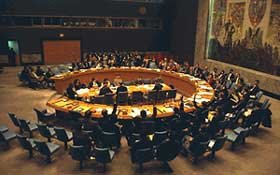
Israel- Hamas standoff: Trouble Brewing
The Middle East is plunged into a new crisis after relative days of calm following the kidnapping of Corporal Gilad Shalit. Militants close to the Hamas government made their way through to Israel across the Gaza strip by means of a secret labyrinth of tunnels to attack the Israel Defense Forces and kidnapping the 19 year old Shalit. This act of terrorism is the first major escalation of violence following the Gaza pullout by Israel and the Hamas land slide victory in the Palestinians elections. Post the Hamas victory both sides have been brow-beating the other into agreeing to their charter of demands. Israel, along with the EU and the US is firm on its demands that Hamas renounce violence, recognize Israel and recognize all pre standing agreements. Hamas on its part wants Israel to free the 10,000 Palestinians languishing in Israeli jails, withdrawal of the Israeli forces to the pre-1967 war borders and dismantling the settlements in the West Bank. As one can see, any areas of broad agreement or consensus on either’s sides’ demands are remote.
The Middle East is plunged into a new crisis after relative days of calm following the kidnapping of Corporal Gilad Shalit. Militants close to the Hamas government made their way through to Israel across the Gaza strip by means of a secret labyrinth of tunnels to attack the Israel Defense Forces and kidnapping the 19 year old Shalit. This act of terrorism is the first major escalation of violence following the Gaza pullout by Israel and the Hamas land slide victory in the Palestinians elections. Post the Hamas victory both sides have been brow-beating the other into agreeing to their charter of demands. Israel, along with the EU and the US is firm on its demands that Hamas renounce violence, recognize Israel and recognize all pre standing agreements. Hamas on its part wants Israel to free the 10,000 Palestinians languishing in Israeli jails, withdrawal of the Israeli forces to the pre-1967 war borders and dismantling the settlements in the West Bank. As one can see, any areas of broad agreement or consensus on either’s sides’ demands are remote.

Trouble has been brewing in the disputed land for some months now, Ariel Sharon’s abrupt departure from the political scene in January left the Middle-East peace process in a lull, and further the defeat of Fatah was considered another blow for the peace process. The new Israeli Prime Minister Ehud Olmert is under tremendous pressure from within his party and his Government to pursue a tough line against the Hamas government which it considers to be a terror outfit. Also, he is keen to show himself as the heir to the Sharon legacy and carry his policies to their logical conclusion. The Gaza withdrawal and the border fencing project, both the brainchild of Sharon, have received impetus under Olmert. Similarly, the response to the kidnapping of an Israeli soldier bears the hallmark of a ‘typical’ Sharon response to such a crisis. However, the build up over the Gaza border and Israeli air force entering Syrian space is a sign of deeper Israeli motives. Yesterday, seven Hamas ministers including hardliners like Marwan Bargouti were arrested by Israel and many Hamas parliamentarians were kept in preventive detention. Israel is stepping up pressure on Syrian President Bashar al-Asad to rein in Kahalid Meshaal, seen by many as the mastermind of the kidnapping. In doing so, Israel is going after the entire Hamas establishment and trying to virtually lock up the Hamas government in its custody. Ultra right wingers in Israel have always criticized the government for its Gaza withdrawal and that the step would lead to a more emboldened Hamas. The past few weeks seems to have vindicated their stand and now their voices seem to the more dominant one even managing to convince the dovish Defense Minister Amir Peretz. The Israeli agenda seems to be to take the Hamas leadership out and virtually make Palestinian President and close US ally Mahmoud Abbas the man who runs the country. In the Israeli scheme of things Abbas is a better bet for peace than the Hamas outfit and they consider Abbas a person they can “do business with”. The US has also defended the Israeli retaliation and it seems their understanding of the current situation is the same as that of Tel Aviv.

However, this simplistic view of taking Hamas out and anointing Abbas as the undisputed leader is fraught with peril. There is a real risk of a major escalation of violence in the region, with Palestinian groups like the Al-Aqsa Martyrs brigade and the Hezbollah stepping up attacks against Israel. Also, with provocative air assaults over Syria, Damascus may be tempted to help back any sort of civilian or militant uprising in the Palestinian territories. While it seems that Israel has made up its mind that working with Hamas is impossible, it will have to chalk out a clear strategy on how to deal with the potentially explosive situation which is gradually building up on both sides of the fence.



